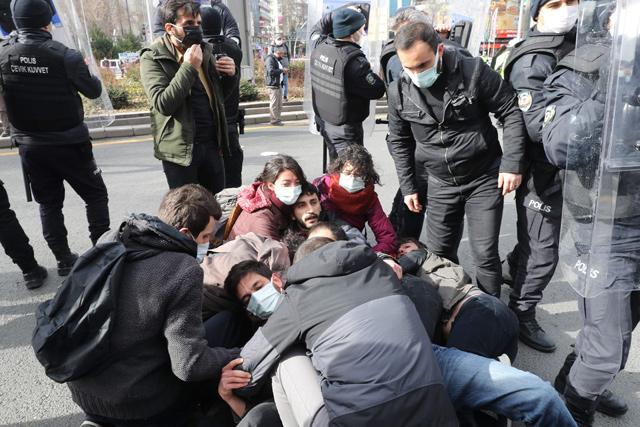- International News
- Web-2021-02-03 | 06:17 pm

Nayrouz News Agency :
— Turkish police fired tear gas on Tuesday and chased people down narrow Istanbul streets as weeks of student protests against President Recep Tayyip Erdogan witnessed some of their heaviest clashes to date.
Turkey has been hit by rallies across major campuses since Erdogan decided to name a party loyalist as the head of Istanbul’s exclusive Bogazici University at the start of the year.
Police detained 159 students after storming a protest staged inside the fenced-off campus on Monday night.
AFP reporters saw plain clothes police drag away dozens of students when they tried to march along a central street in the capital Ankara on Tuesday.
Using anti-riot shields, police fired tear gas to disperse a crowd of around 1,000 people when they tried to stage a demonstration on the Asian side of Istanbul later in the day.
An AFP reporter estimated that 50 to 60 people had been detained in Istanbul by Tuesday evening. One image shared on social media showed protesters hurling objects at the police and officers charging at them with their shields.
The rally had been banned on coronavirus grounds but several opposition lawmakers still turned up.
The sound of clanging pots and pans rang out across various parts of the sprawling city at sunset after organisers called on their supporters to make noise in a show of strength.
Twitter took the rare step of hiding that message under a warning that it violated the platform’s "rules about hateful conduct” — the same thing it did to tweets from former US president Donald Trump before banning him last month.
Twitter hid that message under another "hateful content” warning that requires an extra click to see what the minister said.
‘Vandalism’
The youth-driven demonstrations have echoes of 2013 protests that sprang up against plans to demolish an Istanbul park before spreading nationally and presenting a direct challenge to Erdogan’s rule.
Students have relied heavily on Twitter to get their message out.
Most Turkish television stations and newspapers are controlled by government allies and the demonstrations have barely been mentioned by state media.
And the bond between Turkish protesters and Twitter appears to be growing stronger by the day.
Twitter has been one of the few platforms to resist a new Turkish requirement for social media giants to appoint local representatives who can quickly follow court orders to take down contentious posts.
Turkey hit Twitter with an advertising ban as punishment last month.
Twitter’s continued resistance could make it effectively inaccessible inside Turkey should officials follow through on threats to cut off its bandwidth by 90 per cent in May.
Major platforms such as Facebook and TikTok have appointed local envoys and will avoid future fines and bans.













